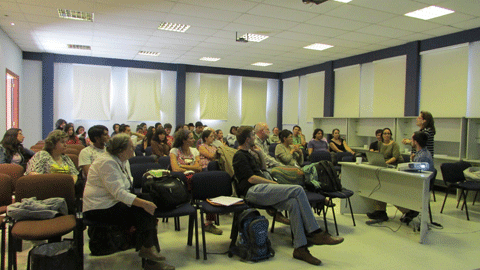ICTA-UAB contributes to the strengthening of the Ethnobiology in Bolivia

20/04/2016
The Plurinational State of Bolivia faces a process of political change that includes the defence of indigenous identity, the revitalisation of traditional knowledge, and embraces environmental management from an intercultural point of view. In this process there is a growing interest in ethnobiological studies, i.e., the interdisciplinary study of the dynamic relations among peoples, biota and the environment. However and despite the growing importance of ethnobiology in Bolivia, the country's universities do not yet have training programmes in this discipline. In this context, a project of inter-university cooperation financed by the Fundació Autònoma Solidaria (FAS) has allowed an exchange of scientific advances in ethnobiology between the National Herbarium of Bolivia (HNB) of the Universidad Mayor de San Andrés (UMSA) and the Institut de Environmental Science and Technology (ICTA) of the Universitat Autònoma de Barcelona (UAB).
As part of this project, an Ethnobiology Workshop was held in La Paz, Bolivia, from 15 to 18 March 2016. The workshop was coordinated by Dr Monica Moraes, a researcher at HNB and Instituto de Ecología-UMSA. It included the participation of four ICTA-UAB researchers (Isabel Diaz-Reviriego Alvaro Fernandez-Llamazares, Maximilien Gueze and Victoria Reyes-García) and researchers from several Bolivian institutions (Daniel Larrea, Wendy Townsend, Gabriela Aguirre, Narel Paniagua Zambrana, and Rainer Bussman). The workshop aimed to strengthen ethnobiology as a discipline, as well as its possible applications from an inclusive, open and transversal perspective, thus expanding the academic offer in ethnobiology in Bolivia. About 100 people participated in the Workshop, including teachers, students and professionals from different disciplines such as biology, anthropology, agronomy or geography. The closing session, which was attended by the Deputy Dean of the Faculty of Pure and Natural Sciences UMSA, included the reading and approval of the Manifesto of the Ethnobiology Workshop, which included the main conclusions of the talks, tutorials and round tables.
In parallel to the realization of the workshop, researchers at ICTA-UAB strengthened the ethnobiological collection of the Botany Library at HNB. Founded in 1984, the library of the HNB is an essential research component of the Herbarium. To date, the emphasis of the collection is in the taxonomic literature, with only the recent acquisition of books related to ethnobotany, and indigenous peoples and languages. However, HNB-UMSA members expressed interest in expanding the literature relative to ethnobiology. In this context, the strengthening of the ethnobiological research line at UMSA was accompanied by the creation of a specialised library collection. In general terms, the ICTA-UAB researchers contributed with specialised literature in relation to the Tsimane’, one of the largest indigenous groups in the Bolivian Amazon, with whom members of the Ethnoecology Laboratory at ICTA-UAB have been working during the last two decades.
Also, with the aim to disseminate results from research activities conducted in Bolivia, several other actions were conducted. At the national level, and within the framework of the Ethnobiology Workshop, we presented and launched two books of Bolivian ethnobiology. One of the books is co-edited by a researcher at ICTA-UAB and his Bolivian counterpart (Reyes-García and Huanca 2014, Cambio local, cambio global. La sociedad tsimane’ ante la globalización) and a second one published by a researcher at the HNB-UMSA (Moraes 2014, Palmeras útiles de Bolivia. Las especies mayormente utilizadas para diferentes fines y aplicaciones). Both books were presented jointly in the cities of La Paz and Rurrenabaque and copies were donated to major universities, libraries and scientific institutions in the country.